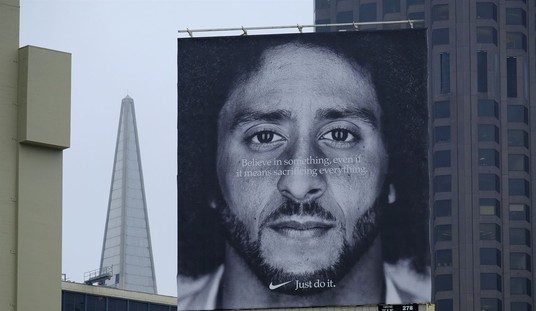The left was all over this story yesterday, marveling at the coincidental timing. For 10 long years Trump fought in court after court to secure the “Trump” trademark in China’s construction industry, and somehow, magically, the mark was only finally granted the very week that he accepted Beijing’s “One China” policy on Taiwan. No one gets that lucky. Do they?
The registration became official on Feb. 14 and was published in a trademark registration announcement on the website of China’s Trademark Office on Wednesday…
Critics say Trump’s global intellectual property interests could be used by foreign states as leverage over the president and may violate the emoluments clause of the U.S. Constitution, which bars public servants from accepting anything of value from foreign governments unless explicitly approved by Congress. These concerns are particularly sharp in China, where the courts and bureaucracy reflect the will of the ruling Communist Party.
The registration this week came as a surprise win for Trump after a decade of trying — and failing — to wrest the rights to his name back from a man named Dong Wei. The abrupt turn in Trump’s bureaucratic fortunes once he declared his candidacy has raised questions about the extent to which his political status may be helping his family business.
The timing does seem awfully shady — until you read this more nuanced WaPo piece, which sets out the timeline in greater detail and argues that there’s nothing necessarily nefarious in Trump’s presidential candidacy having helped him win trademarks in China. The problem with his legal position before, allegedly, was that he wasn’t a big enough name in China to have a clear-cut claim to trademark rights in his name. If Chinese consumers didn’t know who Trump was until recently, by and large, how could a Chinese businessman who owned the “Trump” trademark in the construction industry be said to be trading off of Trump’s brand? Once he became a major U.S. presidential candidate and his fame in China spread, though, the risk of confusion over the “Trump” trademark grew. For that reason, notes WaPo, he was finally awarded the trademark last September — before the election, when Trump was on the trail warning voters day after day of a coming trade war with China. The trademark was only finalized this week.
The decision to back Trump’s trademark claim for construction services relating to residential, business and hotel real estate was first flagged by China’s Trademark Office back in September, when a long-standing rival claim by a Chinese man called Dong Wei was invalidated.
The next step was the publication of Trump’s application for the ownership of the brand in China’s Trademark Gazette on Nov. 13, with the bureau declaring that it would be formally registered three months later if no further objections were received.
On Feb. 14 that finally happened, and Trump’s registration, lasting 10 years, was confirmed on the website of the China Trademark Office on Wednesday.
It’s verrrry easy to construct a shady narrative around that timeline. It’d go like this: China decided to try to butter Trump up last September, seeing that he stood a decent chance of becoming the next president. Just five days after his victory, they set the process for approving his trademark in motion. And then, just four days after he made a major concession to them on Taiwan, they finalized his rights to the mark. It may very well be that the Chinese orchestrated this as a de facto bribe to soften him up in diplomatic relations, notwithstanding the trademark logic I laid out above. Knowing that he wanted his family to continue managing his businesses, they saw a way to make him happy. So they did.
But there’s a major wrinkle in that logic, particularly in the idea that Trump may have traded Taiwan for the trademark. Namely, with the possible exception of Iran, there’s no nation that Trump considers more of a core enemy than China. They’re certainly his public enemy number one on trade. That’s why he made Peter Navarro, one of the noisiest China hawks on the American political landscape, his point man. They’re also a geopolitical adversary, with Trump’s show of support for Shinzo Abe last week aimed squarely at Beijing and its client state, North Korea. Some Trumpers will even tell you that his endless game of footsie with Putin is designed to isolate China, drawing Russia out of Beijing’s orbit. That probably won’t work, but it’s a theory.
Point being, Trump thrives off of perceived conflict with China and is destined to clash with Beijing in numerous ways during the course of his presidency, starting with tariffs — a key to his populist legitimacy — and escalating in a worst-case scenario to a multi-nation war in the China Sea. It’s only slightly overstating things to say that skepticism of, and even antagonism towards, China is his entire foreign policy right now. That being so, to believe that his trademark interests are driving his policy on Taiwan, you need to believe that he’s prepared to reverse the entire thrust of his foreign policy for the right to put up a few hotels in China. I think he’s capable of a lot of venal things but even I’m not that cynical. Besides, as WaPo notes astutely, Trump building projects are likely to do poorly in China with consumers precisely because there’s so much antagonism by him towards Beijing. Assuming, then, that Trump isn’t about to abandon his anti-China posture wholesale — which seems a safe bet to me — how much is the trademark really worth to him? Presumably the moment he makes a hostile move towards Beijing, whether on trade or otherwise, the Chinese are going to rescind it. And Trump knows it.
So, no, I don’t think he traded Taiwan for a trademark he’s almost certainly going to lose at some point anyway and which may not be worth much to him in practical terms even if he doesn’t. I do, however, think it’s fair to suspect China’s intentions in awarding the mark now and to question Trump’s judgment in accepting it. There’s a good case here that this is in fact an “emolument” for constitutional purposes: It’s a benefit conveyed by a foreign government on a federal official for the purpose, at least arguably, of receiving better treatment from him in his official capacity. Congressional Republicans will look the other way at this, but if Democrats retake the House or Senate in 2018, rest assured that you’ll be hearing more about it again when they build a comprehensive conflicts-of-interest case against Trump. Especially since he, er, has another 49 trademark applications pending in China.
Exit question: If it’s true that Trump wasn’t sufficiently well known in China to warrant trademark rights in the construction industry, how has he managed to score 77 trademarks there already in other industries? I assume it has to do with his fame being industry-specific. It may be that the Chinese know him as a TV personality from “The Apprentice” but only recently found out about his past in real estate.








Join the conversation as a VIP Member